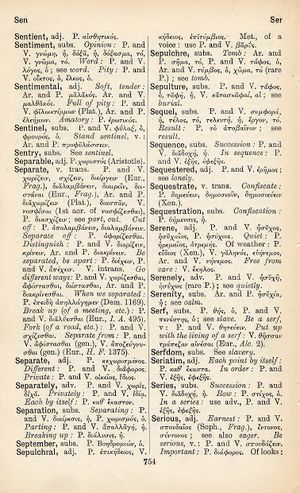separate
Βίων δύο ἔλεγε διδασκαλίας εἶναι θανάτου, τόν τε πρὸ τοῦ γενέσθαι χρόνον καὶ τὸν ὕπνον → Bion used to say that we have two teachers for death: the time before we were born and sleep | Bion said that there are two rehearsals for death: the time before being born and sleep
English > Greek (Woodhouse)
v. trans.
P. and V. χωρίζειν, σχίζειν, διείργειν (Eur., Frag.), διαλαμβάνειν, διαιρεῖν, δαστάναι (Eur., Frag.), Ar. and P. διαχωρίζειν (Plat.), διασπᾶν, V. νοσφίσαι (1st aor. of νοσφίζεσθαι), P. διασχίζειν; see part, cut.
Cut off: P. ἀπολαμβάνειν,διαλαμβάνειν.
Separate off: P. ἀφορίζεσθαι.
Distinguish: P. and V. διορίζειν, κρίνειν, Ar. and P. διακρίνειν.
Be separated, be apart: P. διέχειν, P. and V. ἀπέχειν.
V. intrans. Go different ways: P. and V. χωρίζεσθαι, ἀφίστασθαι, διίστασθαι, Ar. and P. διακρίνεσθαι.
When we separated: P. ἐπειδὴ ἀπηλλάγημεν (Dem. 1169).
Break up (of a meeting, etc.): P. and V. διαλύεσθαι (Eur., I.A. 495).
Fork (of a road, etc.): P. and V. σχίζεσθαι.
Separate from: P. and V. ἀφίστασθαι (gen.), V. ἀποζεύγνυσθαι (gen.) (Eur., H.F. 1375).
adj.
P. κεχωρισμένος.
Different: P. and V. διάφορος.
Private: P. and V. οἰκεῖος, ἴδιος.
Latin > English (Lewis & Short)
sēpărātē: adv., v. separo,
I P a. fin.
Latin > French (Gaffiot 2016)
sēpărātē, seult au comp. separatius : Cic. Inv. 2, 156, à part, plus spécialement.
Latin > German (Georges)
sēparātē, Adv. (separatus), doch nur im Compar., besonders, quaedam argumentationes communiter et similiter tractabuntur, quaedam separatius ad finem adiungentur, Cic. de inv. 2, 156.

